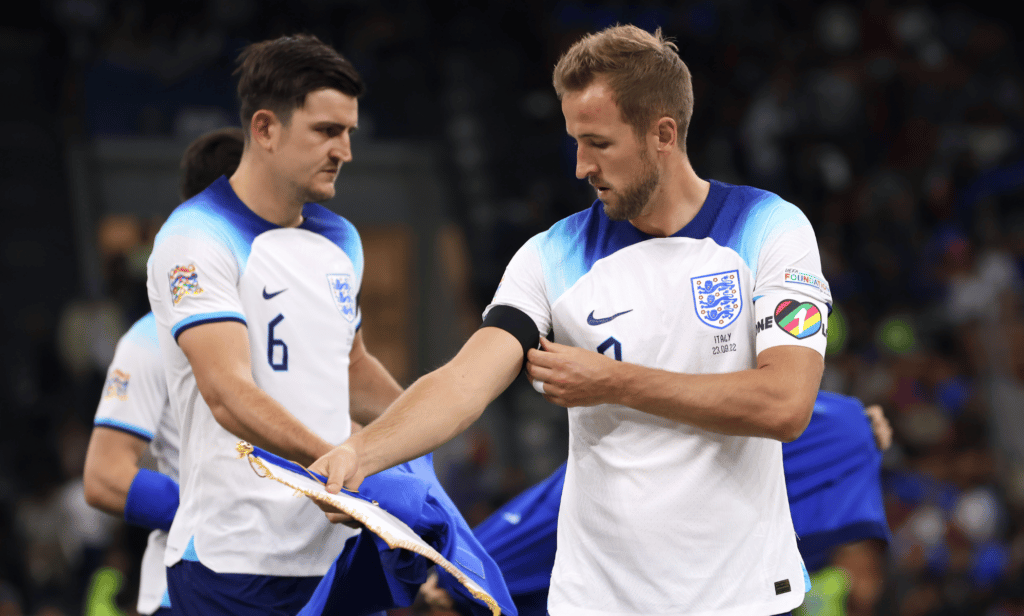BBC presenter slams FIFA ‘cop-out’ after England ditches LGBTQ+ World Cup armbands

England and Wales’ decision not to wear pro-LGBTQ+ “OneLove” armbands at the Qatar World Cup after FIFA threat has been condemned by a BBC sports presenter.
Jack Murley, presenter of the BBC’s LGBT Sport Podcast, was appearing on BBC 5 Live when it was announced that England, Wales and other European nations will not wear the OneLove armbands in Qatar because of the decision by FIFA that it will impose sanctions if players wear the armbands on the field.
FIFA’s decision and the move by the football associations has already sparked widespread condemnation.
“It feels like a bit of a gut punch to me to hear that a symbol of who you are being OK can get you booked at football’s greatest tournament,” Murley said. “That is an extraordinary place to arrive at in 2022.”
Sometimes our job as broadcasters is just having the strength to call a spade a spade.
FIFA’s words about LGBTQ+ folk being welcome at this World Cup don’t match reality, despite what it says.
I tried to explain why on @bbc5live as the armband news broke.
Please listen. pic.twitter.com/AnUxadNqkl
— Jack Murley (@jack_murley) November 21, 2022
Fellow broadcaster Nicky Campbell said some would argue the pro-LGBTQ+ armbands breach the “rules about what [players] can and can’t wear on the pitch”.
One of FIFA’s equipment regulations states that no item of playing kit or clothing “may be worn or used in any controlled area” if the global football body deems it “dangerous, offensive or indecent, includes political, religious, or personal slogans, statements, or images, or otherwise does not comply in full with the laws of the game.”
“It does, but it also – that’s a bit of a cop-out, isn’t it?” Murley said. “Because FIFA have come out with their own armbands, which they’re promoting actively that they worn at different times.”
Murley continued: “The armbands FIFA have proposed say ‘#NoDiscrimination’.
“So we got a OneLove one with a rainbow that says we think there should be no discrimination, and FIFA says, ‘You’ll be booked for that, but you can wear ours that says #NoDiscrimination’.
“I think you have to look at what this is really all about, and the context is this is a World Cup being held in a place where the LGBTQ+ community is criminalised and executed.
“This was a small symbol to say, ‘That isn’t okay. Being who you are and loving who you love is fine’. And that symbol is resulting in a booking.
“I think that’s going to be very hard in 2022 for the LGBTQ+ community to get by.”
The Football Supporters’ Association, which represents fans in England and Wales, said it feels “betrayed”.
“To paraphrase FIFA president Gianni Infantino – today LGBT+ football supporters and their allies will feel angry,” it said.
“Today we feel betrayed. Today we feel contempt for an organisation that has shown its true values by giving the yellow card to players and the red card to tolerance.
“Never again should a World Cup be handed out solely on the basis of money and infrastructure. No country which falls short on LGBT+ rights, women’s rights, worker’s rights or any other universal human right should be given the honour of hosting a World Cup.
“Since 2010 we have been raising questions about the suitability of Qatar as a World Cup host. Everyone could see this coming and it’s astonishing that, on the morning of England’s World Cup opener, FIFA are trying to censor players for sharing a positive message.”
The football governing bodies of England, Wales, Belgium, Denmark, Germany, the Netherlands and Switzerland said in a joint statement that they had written to FIFA in September to inform them about the OneLove armband but had not yet received a response.

English footballer Harry Kane promised to wear the OneLove campaign armband at the World Cup in Qatar and stand in solidarity with other football captains against discrimination. (Getty)
As a result, the football associations said they “can’t put out players in a position where they could face sporting sanctions” because of FIFA’s decision. So they asked the “captains not to attempt to wear the armbands in FIFA World Cup games”.
Several captains, including England’s Harry Kane, planned to wear the rainbow-coloured armband during World Cup matches in Qatar – where LGBTQ+ identities are still criminalised.
Murley admitted being “entirely unsurprised” yet “shocked” that the football associations wouldn’t stand by the pro-LGBTQ+ armband.
The broadcaster added in a post on Twitter that the move by the football associations “proved a step too far”.
“As a broadcaster, I have spent months trying to provide ‘balance’ in a conversation about a World Cup being held in a country that kills people like me, just for being me,” Murley wrote.
I was on-air with @NickyAACampbell on @bbc5live as this news broke.
As a broadcaster, I have spent months trying to provide 'balance' in a conversation about a World Cup being held in a country that kills people like me, just for being me.
But today proved a step too far. https://t.co/f9B155yd8B— Jack Murley (@jack_murley) November 21, 2022
British human rights campaigner Peter Tatchell said the OneLove armband was the “tiniest of gestures” in terms of solidarity with the LGBTQ+ community at the World Cup in Qatar. He added the armband itself “did not specifically mention LGBT+ people”.
“It was a weak campaign but even that was too much for FIFA, who have bullied the England team to not wear it,” Tatchell said.
The campaigner urged team captains from the European countries to “spend just 30 seconds to speak out for the rights of women, LGBTs and migrant workers” in their post-match press conferences.
“That would have a huge impact, reaching a global audience of hundreds of millions of people,” Tatchell said. “FIFA have crushed the OneLove campaign with the threat of yellow cards. It’s time to show FIFA and Qatar the red card.”

